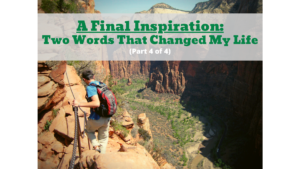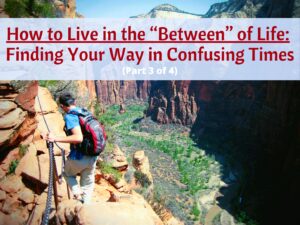“Did You See That?!”
Ever miss something right in front of you?
You lose your keys and ask a spouse or friend to help you find them. Nowhere to be found…then — WOW! — it appears out of nowhere right where you just looked!
So many times I’ve wondered: How did I miss it? Well, focus is part of it as well as a cognitive process called selective attention. And it impacts what we see.
Without giving away spoilers, there is a fantastic video that models this. Even if you’ve seen something like this, watch it all the way through.
Did it fool you? I’ve seen things like this before and they still got me.
Feel bad because you missed it? Don’t. In fact, there’s nothing wrong. That is the way your focus is supposed to work: It helps screen out things that are not important to your focus. BUT it can make you miss things.
What we “see” in life is shaped through core lenses and understandings that we adopt over life.
And it defines what we will catch and what we miss. And in a life of faith the two lenses below can deepen a sense of living everyday life with God. And “see” God more in the everydayness of life.
Core Lens #1: With God, nothing is wasted.
God does not waste anything, whether a blessing, a challenge, or a wrong. Our greatest trials, interruptions, challenges — even rest and Sabbath — are not outside of how He works and brings good.
If you are a follower of Jesus, this one makes logical or intellectual sense. We believe God loves us. He is good AND powerful in ways that we can’t imagine. But it also captures the hope of any heart: That something good can come out of the bad.
We see this theme throughout the story of God. The story of Joseph being wronged by his brothers leads to the growth in faith, resources and ability to ultimately save his family. Or, especially in Jesus, where the suffering and death ultimately lead to resurrection and new life — not just for him but offered to all.
And our lives carry these themes that we each feel in our own ways.
- The inability to fulfill a dream
- The loss of a job
- The death of a loved one
- The betrayal of a friend
- A work challenge
- Suffering from a disease or injury
- A car breaks down in a busy season
- Unreturned love
Each of us experiences such times differently. One person’s “big one” might not be another, but all are painful or challenging. Romans 8:28-29 reminds that God brings good to those who love Him with one of the primary expressions in being shaped to Christ’s image/likeness (Christoformity). (Are you feeling the push-pull of life? Check out Romans 8 or 2 Corinthians 4 to capture the “both-and” tension of trial that dwells in a vision of hope through a life of faith.)
God is with us in the everydayness of life.
All of it — good and bad, victory and defeat, activity or rest — are part of how God shapes and forms you. In this “between,” He is with us in the everydayness of life.
Core Lense #2: We do not desire to waste our lives.
As we grow in following Jesus, we desire to not waste our lives. We want to live wisely, doing good with a rich sense of God’s presence and purpose in the “everyday” moments. It may look like being very active — or being at rest. It might be activities — or it could be relationships.
A life of following Jesus is lived in a particular way — in Jesus’ ways. Ephesians 4-5 is one place that captures a compelling vision of this. It paints a vision that moves well beyond just an outward or behavioral change into a real transformation.
The ultimate result is Christ being formed in us (i.e., Galatians 4:19). So as we abide/dwell with Christ not only do we experience life but others will experience life from how we live. And as we assess and discern our use of time, we can live with a sense of God’s presence in the everyday moments.
A life of following Jesus is lived in a particular way or direction — his! The ultimate result brings life to us and others.
As we realize these, we are able to live with a greater sense of God’s lead and going before us, whatever comes. And they provide the larger context as we prayerfully practice Christian life planning and discernment for everyday life.
**Spoiler Alert**
Life is more complex than gorillas or curtain color changes. But these lenses can help you to focus and seeing more of His hand in life around you — and the transforming work that is occurring in your own life.
What’s Next?
With these two core ideas in place, a couple questions build:
- How do we engage in life planning, productivity or self-leadership themes from a Christian perspective?
- What will we begin to see if we live more of our everyday life with the Triune God of the Christian faith?
Next Time: From its Christian roots, we explore what is — and isn’t — a Nothing Wasted Life.
Looking for More?
Try the monthly newsletter with other ideas and inspiration to encourage and equip you in living everyday life with God as your center. Sign up here to join others on this journey.
THIS SERIES shares the big picture and story around the idea of a Nothing Wasted Life. Check out the other posts:




2 thoughts on “Lessons Learned: Two Core Lenses for Living More of Your Everyday Life with God”
Good article! Just started reading a short book this Lent by Matthew Kelly called “Holy Moments” which parallels some of what you shared. Matthew writes that “making choices is the easy part, living with those choices is the hard part.” So, the trick is to make good choices in the moment so you can experience more Holy Moments (grace-filled experiences vs. regrets). Easy said than done, but with God’s help, always possible. 🙂
That’s well said…by him and you!! Thanks for sharing that Greg.👍
Comments are closed.